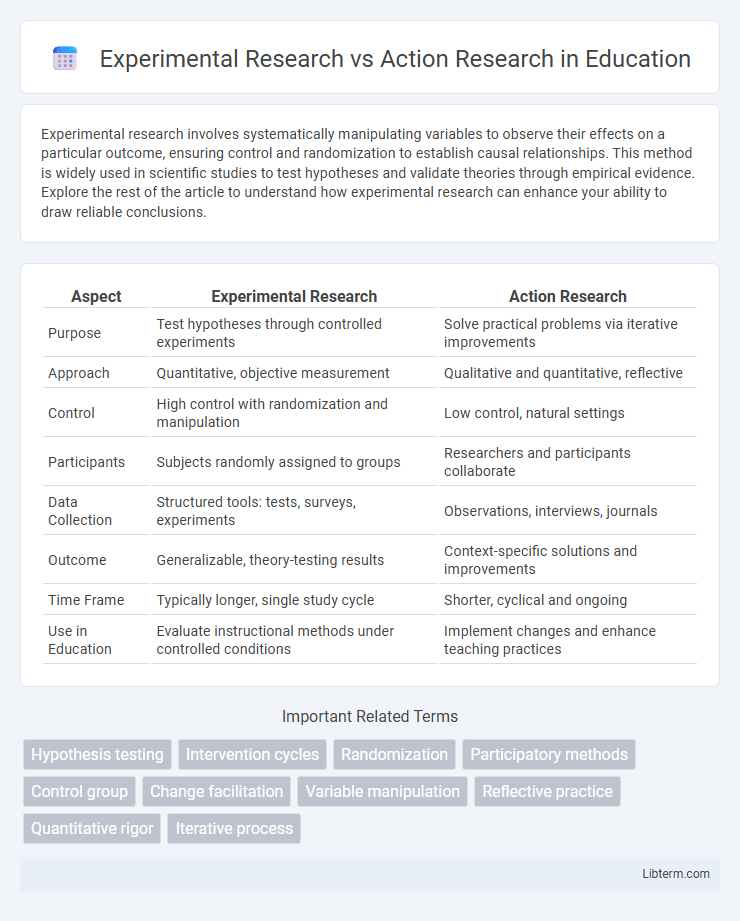Experimental research involves systematically manipulating variables to observe their effects on a particular outcome, ensuring control and randomization to establish causal relationships. This method is widely used in scientific studies to test hypotheses and validate theories through empirical evidence. Explore the rest of the article to understand how experimental research can enhance your ability to draw reliable conclusions.
Table of Comparison
| Aspect | Experimental Research | Action Research |
|---|---|---|
| Purpose | Test hypotheses through controlled experiments | Solve practical problems via iterative improvements |
| Approach | Quantitative, objective measurement | Qualitative and quantitative, reflective |
| Control | High control with randomization and manipulation | Low control, natural settings |
| Participants | Subjects randomly assigned to groups | Researchers and participants collaborate |
| Data Collection | Structured tools: tests, surveys, experiments | Observations, interviews, journals |
| Outcome | Generalizable, theory-testing results | Context-specific solutions and improvements |
| Time Frame | Typically longer, single study cycle | Shorter, cyclical and ongoing |
| Use in Education | Evaluate instructional methods under controlled conditions | Implement changes and enhance teaching practices |
Introduction to Research Methodologies
Experimental research systematically tests hypotheses through controlled variables and random assignment, producing quantifiable and replicable data to establish cause-and-effect relationships. Action research involves iterative problem-solving within real-world contexts, emphasizing collaboration between researchers and participants to generate practical solutions and enhance processes. Both methodologies contribute uniquely to advancing knowledge, with experimental research prioritizing control and objectivity, while action research focuses on context and stakeholder engagement.
Defining Experimental Research
Experimental research is a systematic investigation that manipulates one or more variables to determine their effect on a dependent variable, establishing cause-and-effect relationships. It involves controlled conditions, random assignment, and the use of control groups to enhance internal validity and minimize biases. This research design is widely used in natural and social sciences to test hypotheses and generate empirical evidence.
Understanding Action Research
Action research emphasizes iterative problem-solving through collaboration between researchers and participants within real-world settings, fostering practical improvements and organizational learning. Unlike experimental research, which relies on controlled environments and variable manipulation to establish causality, action research adapts dynamically to changing contexts and prioritizes stakeholder engagement. This participatory approach generates actionable insights tailored to specific community or organizational challenges, enhancing relevance and immediate application.
Key Differences Between Experimental and Action Research
Experimental research primarily involves controlled conditions to test hypotheses and establish cause-effect relationships through manipulation and randomization, emphasizing quantitative data. Action research centers on solving practical problems in real-world settings through iterative cycles of planning, acting, observing, and reflecting, often involving collaboration with participants and qualitative data. The key differences lie in their goals, methodology, and application: experimental research aims for generalizable knowledge with strict control, while action research focuses on immediate improvement within specific contexts through participatory processes.
Research Design: Experimental vs Action Approaches
Experimental research design involves controlled settings where variables are manipulated to establish cause-and-effect relationships, ensuring high internal validity through randomization and control groups. Action research design emphasizes iterative cycles of planning, acting, observing, and reflecting within naturalistic settings, aiming for practical problem-solving and participant collaboration. The experimental approach prioritizes hypothesis testing and outcome measurement, while the action research approach focuses on contextual understanding and continuous improvement.
Data Collection Methods in Both Research Types
Experimental research primarily relies on controlled data collection methods such as laboratory experiments, randomized trials, and structured observations to establish causality and test hypotheses. Action research involves iterative cycles of data collection using qualitative techniques like participant observations, interviews, and reflective journals to address practical problems within a specific context. Both methods emphasize precise data gathering but differ in the degree of control and the immediacy of applying findings to real-world settings.
Applications and Use Cases
Experimental research is extensively applied in scientific fields like psychology, medicine, and biology to test hypotheses through controlled experiments and manipulate variables for cause-and-effect analysis. Action research is predominantly used in education, organizational development, and community settings to solve practical problems through iterative cycles of planning, acting, observing, and reflecting. While experimental research focuses on generating generalized knowledge, action research emphasizes collaborative problem-solving and real-time improvements within specific contexts.
Strengths and Limitations
Experimental research offers strong internal validity through controlled variables and random assignment, enabling clear cause-and-effect conclusions but may suffer from limited external validity due to artificial settings. Action research excels in practical problem-solving within real-world contexts and promotes participant collaboration, though its findings often lack generalizability and rigorous control. Both methodologies provide valuable insights, with experimental research emphasizing precision and replicability, while action research prioritizes contextual relevance and adaptive learning.
Ethical Considerations
Experimental research demands strict adherence to ethical guidelines such as informed consent, confidentiality, and minimizing harm due to its controlled manipulation of variables. Action research emphasizes collaborative ethics, prioritizing participant involvement and reflexivity to ensure respect and transparency throughout the iterative process. Both methodologies require careful scrutiny of ethical implications to maintain integrity and protect the well-being of participants.
Choosing the Right Method for Your Study
Selecting the appropriate research method hinges on the study's objectives, with experimental research ideal for testing hypotheses under controlled conditions to establish cause-and-effect relationships. Action research suits studies aiming to solve practical problems through iterative cycles of planning, acting, observing, and reflecting within real-world settings. Consider experimental research for theory validation and action research for contextual problem-solving to ensure methodological alignment with research goals.
Experimental Research Infographic

 libterm.com
libterm.com